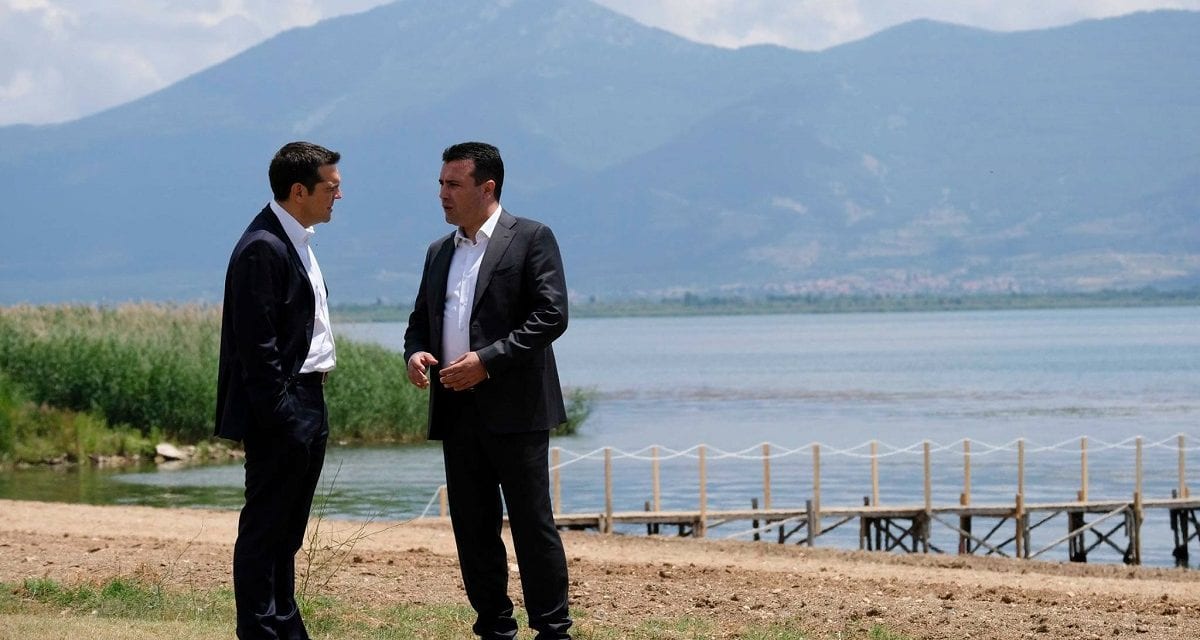By Alec Mally, Director for Global Economic Affairs at IPEDIS-New Europe
Greece’s Prime Minister Alexis Tsipras is set to deliver on his promised trip to North Macedonia’s capital, Skopje, on 2 April, which was announced with some fanfare at the Delphi Economic Forum in early March.
This will be Tsipras’ first trip to Skopje as Prime Minister and second official visit to the country. A range of hastily-generated bilateral agreements will be signed as the visit’s “deliverables,” although the durability of some of these agreements will be in question as Greek elections approach.
The political situation in Greece remains delicate, as Tsipras is trailing substantially in the polls which continue to show close to 60% of the Greek population opposed to last June’s bilateral deal to resolve the Name Dispute, the so-called Prespes Agreement. North Macedonian Prime Minister Zoran Zaev must plot his next moves carefully if he visits Greece before the next elections to avoid provoking an unravelling of the Prespes Agreement.
Endangered agreement, endangered leaders?
While Tsipras would hope to use the visit to burnish his personal credentials as a force for regional stability, the main question most people in both countries have is when he will announce Greek parliamentary elections, which must be held by October. Many still hope the elections will be held simultaneously with Euro-elections in late May. North Macedonia itself has (direct) Presidential elections scheduled for April 21.
Even though there is real work to be done in improving the bilateral relationship, the electoral dynamics in both countries, as well as Tsipras’ continued low polling numbers, will permeate much of what transpires during Tsipras’ visit. As Tsipras’ host in Skopje, Zaev must find a way to improve his image with more of the Greek population which still largely resents his frequent public comments on the “Macedonian nationality and language” that many Greeks loudly accuse Tsipras of foolishly handing over to Skopje in the 2018 negotiations for the Prespes Agreement. Undoubtedly, this will cost Tsipras heavily in all the upcoming elections and is a major theme of all discussions on Tsipras approach to the Name Dispute.
The economic component is not all show, but expect few major developments
Tsipras is trying to portray the trip as being focused on significant economic and commercial objectives and is hoping to use this to partially reverse his party’s fading fortunes in Northern Greece. He is travelling with a business delegation of over 70 business leaders and a large number of ministers. A series of bilateral agreements including an agreement on the avoidance of double taxation will be signed.
Some Greek business leaders have loudly refused to support the government’s efforts to prepare the ground for the trip, which also included a separate visit by Tsipras March 29 to Thessaloniki to discuss the new commercial opportunities said to be opening up after the Prespes Agreement. Tsipras was jeered while visiting the city.
The controversial aspects of the Prespes deal — involving new bilateral procedures to negotiate product labelling and trademark disputes — are generally seen as negative developments by Greek industrialists who have up to now needed no permission of any kind to call their products “Macedonian” as long as they were in line with EU regulations. Business opposition to the Prespes Agreement is coalescing around this issue, something Greece’s main opposition party, New Democracy, is focusing on heavily, while also categorising the Prespes Agreement as a betrayal of Northern Greece.
The irony of the Greek Prime Minister leading a delegation to Skopje to discuss trade and potential Greek investments, when Greece itself is desperately seeking foreign investment and making scant progress, has not been lost on the opposition and media analysts.
Despite Tsipras’ attempts to emphasise the positive aspects of the Prespes Agreements as opening new opportunities, history shows that Greek companies have successfully found ways to negotiate major investments with Skopje in the years after the 1995 Interim Agreement with the then-FYROM, and knowledgeable observers have been asking for details about what new investments might be found that Greek companies haven’t already bought up or made years ago and later sold off.
Energy linkages can be expanded
One area where progress can be expected is in the area of energy linkages. Greek companies have long been active in the transport of fuel to North Macedonia via Thessaloniki and a Greek-funded pipeline is already one of the country’s primary energy import channels. Briefing the press ahead of Tsipras’ trip, the Greek Minister of Environment and Energy, Giorgos Stathakis, stated that Greek energy companies are showing strong interest in the interconnection as well as the expansion of the gas, electricity and oil networks between Greece and its northern neighbour.
Foreign support for this trip will be spun against Tsipras
In Greece’s tense pre-election atmosphere, Tsipras’ detractors will be looking for proof in the international media of their main thesis, that the Prespes Agreement was actually imposed on the parties from abroad. Accordingly, supportive tweets from foreign leaders and organizations such as NATO or the UN will be used against Tsipras, and the positive messages of NGOs that support the Prespes Agreement and North Macedonia’s Euro-Atlantic integration will be ridiculed in Greece.
Should Zaev visit Athens?
Although obligated to pay a return visit to Athens if invited, a Zaev visit to Athens before Greek parliamentary elections are held may well turn out to be a bad investment and will certainly disadvantage his country if New Democracy leads the next Greek government, since a visit in the coming months would reinforce the already strong impression that North Macedonia’s relationship with Greece depends on Tsipras’ rapidly fading SYRIZA party.
Zaev must plot his next moves carefully if visiting Greece before elections or when discussing the nationality issue to avoid provoking an unravelling of the Prespes Agreement, which would be of little concern to most Greek citizens, if current polls are accurate, and in Northern Greece, this would actually be welcome news.



















